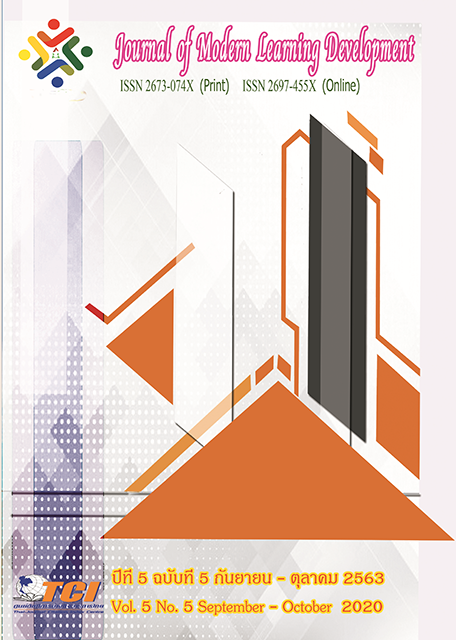ภาวะผู้นำเชิงจริยธรรมตามหลักพุทธธรรมของผู้บริหารสถานศึกษา
Main Article Content
บทคัดย่อ
การนำหลักคำสอนในทางพุทธศาสนาไปศึกษา วิเคราะห์ แล้วนำไปประยุกต์ใช้ให้เข้ากับหลักการปกครองสำหรับภาวะผู้นำก็จะทำให้หลักพุทธธรรมมีส่วนในการเสริมสร้างคุณธรรมและก่อให้เกิดการพัฒนาผู้นำหรือผู้ปกครองทุกระดับชั้นอย่างมีคุณภาพ กล่าวคือมีการพัฒนาชีวิต ชุมชน สังคม และประเทศชาติ ให้มีความเจริญก้าวหน้าทางด้านคุณธรรมและจริยธรรม เมื่อคนในสังคมมีการพัฒนาชีวิตให้ดีขึ้นก็จะมาพัฒนาครอบครัว พัฒนาชุมชน และพัฒนาสังคมให้ดีขึ้นด้วยเช่นกัน ดังนั้นหลักธรรมจึงเป็นพื้นฐานในการพัฒนาความเป็นผู้นำอย่างแท้จริง การบริหารสถานศึกษาที่มีประสิทธิภาพนั้นขึ้นอยู่กับองค์ประกอบหลายประการทั้งจากภายในและภายนอกองค์กร ดังนั้นผู้บริหารสถานศึกษาเป็นบุคคลที่มีความสำคัญอย่างยิ่งของสถานศึกษาในการเป็นแบบอย่างที่ดีที่จะนำสถานศึกษาให้มีประสิทธิภาพสู่ความสำเร็จ จึงต้องมีคุณลักษณะของภาวะผู้นำเชิงจริยธรรมตามหลักพระพุทธธรรม ได้แก่ มีความซื่อสัตย์ มีความยุติธรรม มีความมุ่งมั่น ขยัน อดทน มีความรับผิดชอบสูง มีความคิดริเริ่มสร้างสรรค์ มีภาวะผู้นำสูง เป็นคนกล้าคิด กล้าเปลี่ยนแปลง กล้าตัดสินใจ มีคุณธรรมจริยธรรม มีวุฒิภาวะทางอารมณ์สูง เป็นบุคคลแห่งการเรียนรู้และมีความจริงใจ ในการบริหารสถานศึกษาให้มีประสิทธิภาพและประสบกับความสำเร็จได้นั้นไม่มีทฤษฎีและหลักการใดที่เหมาะสมที่สุดที่สามารถนำมาใช้บริหารได้กับทุกสถานศึกษา
Article Details
เอกสารอ้างอิง
คำ พาหอม. (2554). ธรรมเพื่อชีวิต. พระนครศรีอยุธยา: มหาวิทยาลัยราชภัฏพระนครศรีอยุธยา.
จักรพรณร วงศ์พรพวัณ (2559). ปรัชญาการศึกษากับการเรียนรู้ของมนุษย์. เลย: เลยปริ้น.
จำเริญรัตน์ เจือจันทร์ (2558). จริยศาสตร์ทฤษฎีจริยธรรม สำหรับนักบริหารการศึกษา. กรุงเทพมหานคร: พริ้นติ้ง เฮ้าส์ เอส. โอ.
เชี่ยวชาญ ภาระสงศ์ และคณะ (2555). ภาวะผู้นำการเปลี่ยนแปลงกับประสิทธิผลการบริหารงานวิชาการของโรงเรียนมัธยมศึกษา สังกัดสำนักงานเขตพื้นที่การศึกษาจังหวัดนครพนม เขต 1. วารสารมหาวิทยาลัยราชภัฏสกลนคร, 4 (7), 103-115.
พระราชญาณวิสิฐ. (2550). รวมปาฐกถาธรรม 9 เรื่อง. (พิมพ์ครั้งที่ 2). กรุงเทพมหานคร: คณะดิษยานุศิษย์.
Avolio, B. J. and Gardner, W. L. (2005). Authentic Leadership Development: Getting to the Roof of Positive Forms of Leadership. The Leadership Quarterly, 16(3), 315-338.
Avolio, B.et al., (2004). Authentic Leadership: Theory Building for Veritable Sustained Performance. Working paper. Lincoln: Gallup Leadership Institute, University of Nebraska.
Brown, M. E. and Treviño, L. K. (2006). Ethical Leadership: A Review and Future Directions. The Leadership Quarterly, 17(6), 595–616.
Daft, R. L. (2005). The Leadership Experience. (3rd ed). Ohio: Thomson South-Western.
Fry, L. W. (2003). Toward a Theory of Spiritual Leadership. The Leadership Quarterly, 14 (6), 693-727.
Hoffman, M. L. (1988). Moral Development. In Development Psychology: An Advanced Textbook. Edited by M. H. Bornstein; & M. E. Lamb. (2nd ed). NJ: Lawrence Erlbaum.
Jaramillo, F et al., (2006). The Role of Ethical Climate on Salesperson’s Role Stress, Job Attitudes, Turnover Intention, and Job Performance. Journal of Personal Selling & Sales Management, 26(3), 271-282.
Reave, L. (2005). Spiritual Values and Practices Related to Leadership Effectiveness. The Leadership Quarterly, 16(5), 655-687.
Sims, R. R. and Brinkmann, J. (2002). Leaders as Moral Role Models: The Case of John Gutfreund at Salomon Brothers. Journal of Business Ethics, 35(4), 327-339.
Treviño, L. K et al., (2003). A Qualitative Investigation of Perceived Executive Ethical Leadership: Perceptions from Inside and Outside the Executive Suite. Human Relations, 56(1), 5-37.
Wayne K. Hoy et al., (2002). Toward an Organizational Model of Achievement in High Schools: The Significance of Collective Efficacy. Educational Administration Quarterly, 38(1), 77-93.
Zhu, W. (2008). The Effect of Ethical Leadership on Follower Moral Identity: The Mediating Role of Psychological Empowerment. Leadership Review, 8 (Spring), 62-73.


